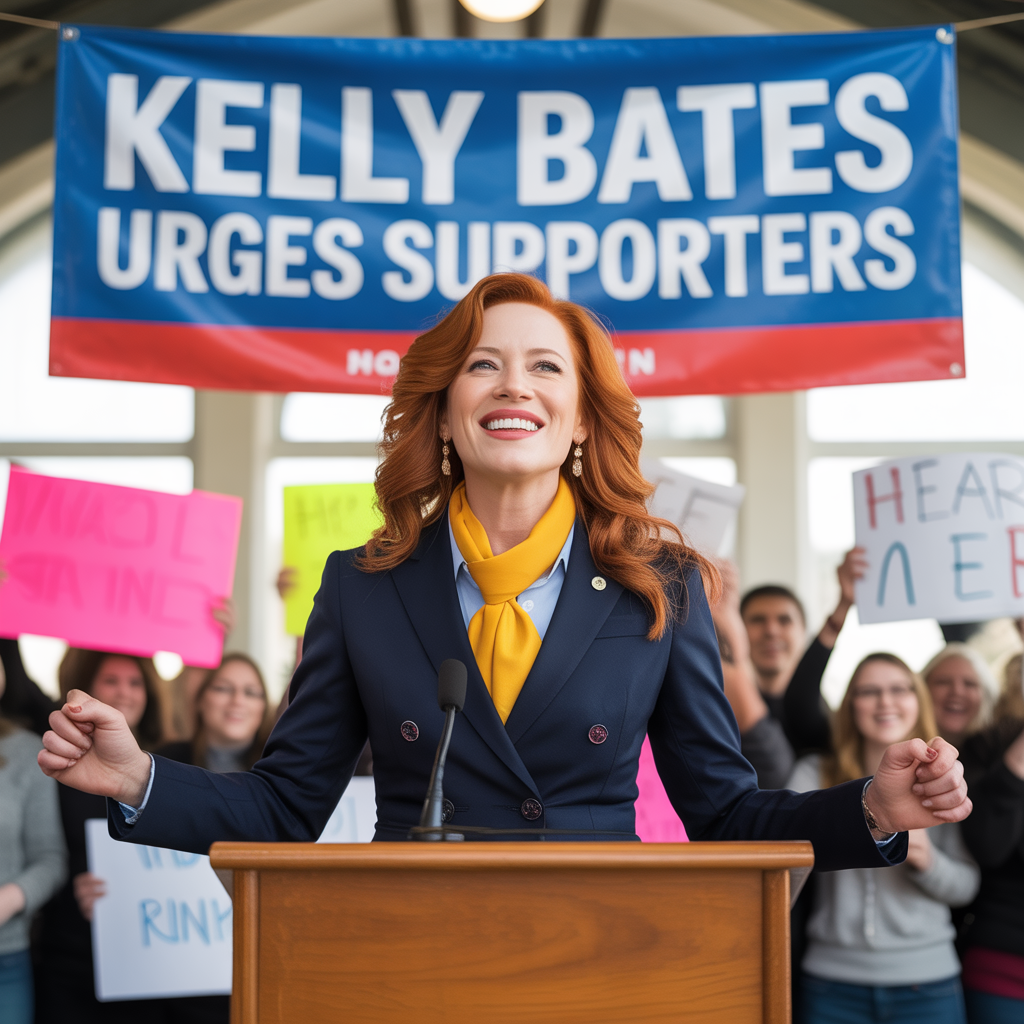When Kelly Bates disappeared from NBC 10’s airwaves, loyal viewers didn’t just notice they erupted.
The beloved meteorologist’s sudden absence triggered a social media backlash that threatened to consume the Providence station’s reputation.
But then something unexpected happened: Bates herself stepped forward to defend the very organization her supporters were attacking.
This wasn’t your typical celebrity-fan dynamic.
What unfolded revealed profound lessons about emotional intelligence, media accountability, and the complex relationship between public perception and institutional reality.
Who Is Kelly Bates? The Meteorologist Rhode Island Trusted
Kelly Bates spent over a decade forecasting weather for NBC 10 WJAR in Providence, Rhode Island.
She wasn’t just another talking head reading temperatures off a teleprompter.
Viewers trusted her with their daily plans, their weekend getaways, their children’s outdoor activities.
Her presence felt consistent and reliable. Storm approaching? Kelly had the details. Beautiful weekend ahead? She’d help you plan it.
That daily reliability built something television executives often underestimate: genuine community trust.
Beyond weather reports, Bates engaged actively on social media. She responded to viewer questions, shared behind-the-scenes glimpses of meteorology work, and demonstrated the kind of authentic communication that transforms viewers into genuine supporters.
Awards recognized her meteorological expertise. Community events featured her presence.
Local schools welcomed her for educational programs about weather science. She became woven into Rhode Island’s daily fabric not just a broadcaster but a familiar face representing stability.
The Departure That Sparked Outrage
Here’s where things got complicated.
Bates’ departure from NBC 10 wasn’t announced through official channels initially. Viewers simply noticed her absence.
One day she was there; the next she wasn’t. The communication breakdown created an information vacuum that speculation rushed to fill.
Social media lit up with questions. Where did Kelly go? Why wasn’t she on air? What happened?
NBC 10 remained largely silent while viewers’ confusion transformed into frustration and then anger.
When details finally emerged reportedly involving contract negotiations that couldn’t be resolved supporters felt betrayed.
Not by Bates, but by the station. The perception formed that NBC 10 had wronged a beloved community figure, and people wanted someone held accountable.
The Backlash: When Loyalty Becomes Weaponized
Public reaction came swift and fierce.
NBC 10’s social media channels flooded with angry comments. Google reviews tanked as supporters left one-star ratings.
Calls for boycotts circulated. Some demanded the station hire Bates back immediately. Others targeted station management with personal attacks.
The grassroots movement that emerged shared characteristics with modern outrage culture:
- Immediate mobilization through social platforms
- Emotional intensity overwhelming measured discussion
- Targeting individuals beyond organizational criticism
- Demands for immediate action without understanding complexity
- Parasocial relationships feeling like personal betrayals
This wasn’t unique to Rhode Island. Similar scenarios play out regularly when beloved media personalities exit unexpectedly.
The audience investment runs deeper than rational business relationships might suggest.
Station employees from on-air talent to behind-the-scenes crew found themselves caught in crossfire aimed at management decisions they didn’t make.
The public backlash didn’t discriminate between decision-makers and colleagues simply trying to do their jobs.
Kelly Bates’ Crucial Message: “Please Don’t”
Then Kelly Bates intervened with a message that demonstrated remarkable leadership in activism.
Through her social media platforms, she directly addressed supporters. Her tone balanced gratitude for their loyalty with firm boundary-setting.
She thanked them for caring but explicitly asked them to stop attacking NBC 10.
Key elements of her strategic communication included:
Acknowledging emotions: She validated that people felt upset and disappointed. Their feelings mattered and she appreciated their support.
Setting clear boundaries: No harassment of station staff. No negative campaigns. No continued attacks on the organization.
Protecting colleagues: She emphasized that people still working at NBC 10 didn’t deserve abuse over decisions they didn’t control.
Taking the high road: Despite any personal feelings about her departure, she refused to fuel the fire or encourage continued hostility.
This wasn’t just good crisis communication it was character revelation.
Bates could have remained silent, letting supporters fight battles she might have secretly appreciated. Instead, she demonstrated empathy in leadership by considering impacts beyond her immediate situation.
Why She Defended NBC 10: Understanding Nuance
Bates’ defense of her former employer revealed sophisticated understanding of media relations and professional dynamics.
Protecting professional relationships mattered. Burning bridges serves no one’s long-term interests.
The television industry operates within relatively small professional circles. Today’s colleagues become tomorrow’s references, collaborators, or employers.
Recognizing complexity in business decisions. Contract negotiations involve multiple factors:
budget constraints, market conditions, corporate mandates, competitive positioning.
What looks like simple unfairness from outside often involves legitimate competing interests.
Understanding power dynamics. On-air talent and behind-the-scenes staff operate under different power structures.
Attacking the station hurt people with zero decision-making authority over talent contracts.
Her emotional management in this situation demonstrated maturity rare in public figures.
She could have weaponized supporter anger for leverage or revenge. Instead, she chose constructive engagement even while processing her own disappointment.
Supporter Response: When Your Champion Says Stop
The community activism that mobilized so quickly faced an interesting test: Would they honor Bates’ request?
Most supporters complied. Negative reviews disappeared. Social media tone shifted. The campaign redirected energy toward supporting Bates directly rather than attacking NBC 10.
But compliance wasn’t universal. Some supporters argued they had the right to express dissatisfaction regardless of Bates’ wishes.
They believed media accountability required public pressure. Stations needed to understand consequences when treating beloved figures poorly.
This tension revealed competing values:
| Supporter Perspective | Core Belief |
|---|---|
| Honor Kelly’s Request | Loyalty means respecting her wishes even when disagreeing |
| Continue Pressure | Accountability requires consequences; silence enables mistreatment |
| Redirect Energy | Support Kelly’s future rather than dwell on past grievances |
| Demand Transparency | Stations owe audiences explanations for major changes |
The debate itself demonstrated healthy aspects of civic engagement. People wrestling with competing principles loyalty vs.
accountability, respect vs. justice showed thoughtful activism rather than blind reactions.
NBC 10’s Position: Silence as Strategy
NBC 10’s public relations approach involved minimal public comment. The station didn’t provide detailed explanations about Bates’ departure or respond extensively to criticism.
This strategy reflects common media industry practice:
Personnel matters stay private. Broadcasting contract details or negotiation specifics creates legal risks and sets uncomfortable precedents.
Minimizing controversy duration. Extensive responses extend news cycles. Silence often allows stories to fade faster.
Protecting remaining staff. Detailed public discussions might expose colleagues to unwanted attention or complicate their working relationships.
Business autonomy. Stations maintain they don’t owe audiences explanations for employment decisions, even when those decisions affect beloved personalities.
From a media ethics perspective, this approach has defenders and critics. Transparency advocates argue audiences deserve context when major changes occur.
Business pragmatists counter that employment negotiations shouldn’t become public theater.
The Power of Parasocial Relationships
What made this situation so emotionally charged? Parasocial relationships the one-sided connections audiences form with media personalities.
Viewers invited Kelly Bates into their homes daily. She helped them plan weddings, warned them about dangerous storms, brought reassuring expertise during anxiety-inducing weather events.
That daily presence created psychological bonds feeling remarkably similar to actual relationships.
When she disappeared suddenly, brains processed it like a friend vanishing without explanation.
The emotional appeal driving supporter anger wasn’t irrational it reflected genuine psychological bonds formed through repeated positive interactions.
Television executives often underestimate these connections’ strength. To management, talent represents contracts and budget line items. To audiences, personalities represent trusted relationships.
Media literacy should include understanding these dynamics.
Recognizing parasocial relationships as real emotional experiences while maintaining perspective about their one-sided nature helps navigate situations like Bates’ departure more healthily.
Lessons for Media Professionals
The Kelly Bates situation offers clear lessons for television stations and media organizations:
Communicate proactively during transitions. Information vacuums fill with speculation and resentment.
Brief official statements acknowledging departures without violating privacy serve everyone better than silence.
Build institutional loyalty alongside personality loyalty. Audiences should connect with station brands and values, not solely individual faces.
Succession planning should prepare viewers for inevitable transitions.
Protect staff during controversies. Clear communication distinguishing between decision-makers and affected employees helps direct criticism appropriately.
Understand audience investment. Dismissing viewer emotions as irrational misses the genuine psychological bonds that make local news valuable.
Empathy and restraint in management decisions acknowledges these realities.
Maintain transparent communication even when legally limited. Saying “We can’t discuss personnel matters but appreciate Kelly’s contributions” beats total silence.
Lessons for Supporters and Audiences
Audiences navigating similar situations should consider:
Healthy expression vs. harassment. Supporting departing personalities doesn’t require attacking others.
Constructive criticism respects boundaries while expressing disappointment.
Understanding business complexity. Beloved figures can leave for numerous legitimate reasons career opportunities, personal decisions, insurmountable contract differences. Assuming malice without evidence serves no one.
Respecting wishes and boundaries. When public figures explicitly ask supporters to stop certain behaviors, honoring those requests demonstrates genuine respect.
Separating individuals from institutions. People working at organizations don’t necessarily support every corporate decision.
Managing outrage means directing feedback appropriately.
Channeling energy constructively. Supporting someone’s future endeavors helps them more than dwelling on past grievances helps anyone.
The Kelly Bates supporters who redirected energy toward following her new ventures demonstrated this wisdom.
They honored her request while maintaining their loyalty the best possible outcome.
Where Kelly Bates Is Now
Following her NBC 10 departure, Kelly Bates continues engaging with her Rhode Island audience through social media.
She maintains the warm, accessible presence that built her following.
Her handling of the controversy enhanced her reputation beyond meteorology expertise.
She demonstrated leadership, emotional intelligence, and strategic thinking that transcends weather forecasting.
The situation ultimately showcased how responsible activism and thoughtful communication can transform potentially ugly situations into teaching moments.
Bates emerged as more than a meteorologist she became an example of grace under pressure.
The Bigger Picture: When Audiences Mobilize
The Kelly Bates story reflects broader patterns in modern media-power dynamics.
Social media gives audiences unprecedented power to reward or punish media organizations through collective action.
This democratizes media accountability while sometimes amplifying mob dynamics.
Balanced coverage requires understanding these tensions. Stations must remain responsive to audiences while maintaining operational autonomy.
Viewers deserve respect and consideration without controlling every business decision.
Public trust in media depends partly on how these situations resolve. Transparency, empathy, and constructive dialogue build stronger relationships than silence or defensiveness.
The future of media relations involves navigating these dynamics more skillfully.
As Kelly Bates demonstrated, sometimes the most powerful response to anger is requesting restraint rather than fueling conflict.
Final Thoughts: Grace Wins
Kelly Bates faced a situation where weaponizing supporter anger offered tempting options.
She could have stayed silent, tacitly approving attacks. She could have fanned flames with carefully worded grievances.
Instead, she chose empathy, restraint, and protection of others even those involved in decisions she might have disagreed with.
That choice revealed character worth celebrating beyond any weather forecast.
Her supporters, largely honoring her request, showed that community activism can remain principled even when emotions run high.
Their ability to redirect passion constructively demonstrated movement sustainability over reactive destruction.
NBC 10 continues broadcasting. Kelly Bates continues connecting with Rhode Island audiences.
The controversy faded, leaving lessons about emotional management, strategic communication, and the power dynamics between media institutions and the personalities who give them faces.
Sometimes leadership means asking people who love you to put down their weapons.
And sometimes the greatest loyalty means honoring that request even when your anger still burns hot.
Read more knowledgeable blogs on Pun Dazzle

Philipp Engel is a passionate writer and pun lover dedicated to spreading laughter and joy through words. As the creator and author of the website Philipp Engel, he delivers a delightful mix of puns, jokes, and playful humor that entertains readers of all ages. With a sharp wit and a deep love for language, Philipp aims to brighten every visitor’s day with clever wordplay and a smile, making humor a universal language that connects people everywhere.








